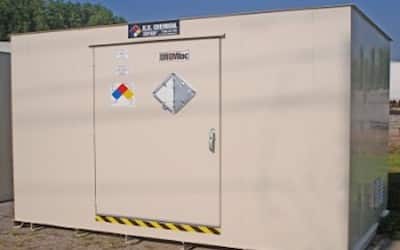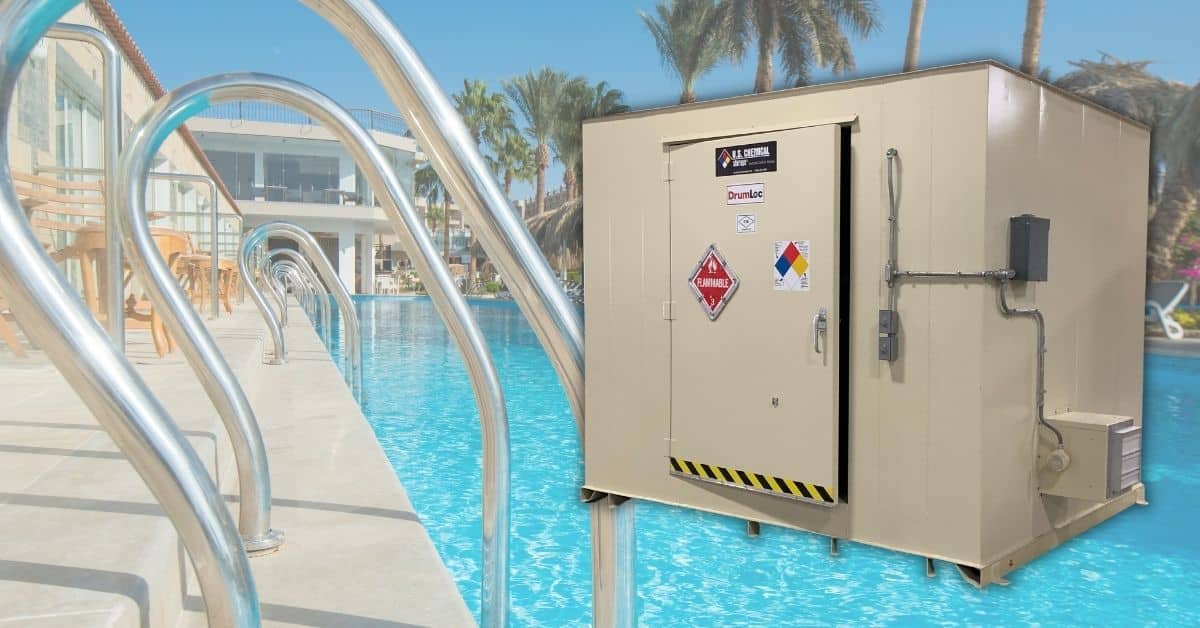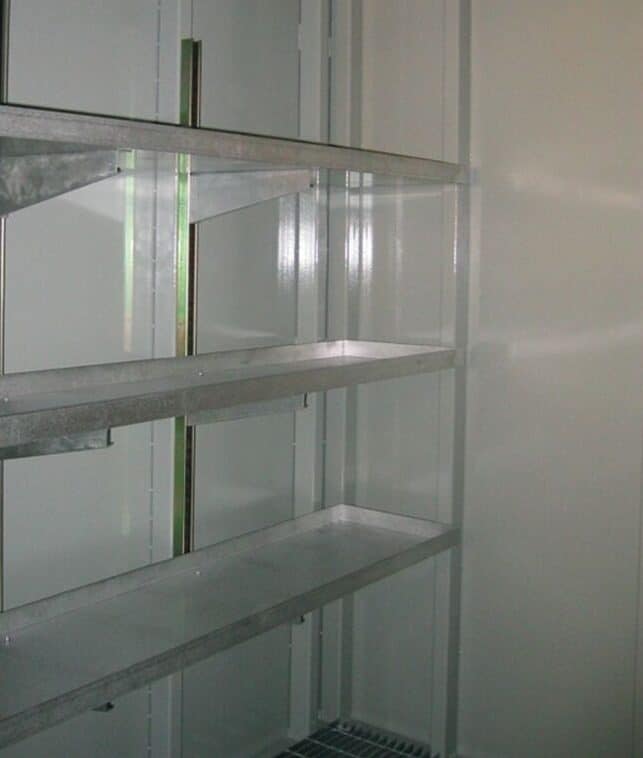Pool Chemical Storage

Updated May 8th, 2024
Chlorine agents and acids are common swimming pool chemicals for controlling water quality. Unfortunately, these chemicals are incompatible.
Catastrophic consequences can occur if proper swimming pool chemical storage is not implemented. So, how can you ensure your pool chemicals are properly stored?



What Are Pool Chemicals?
Swimming pool chemicals include a variety of disinfectants and sanitizers designed to control the growth of algae, bacteria and other forms of infectious organisms. Liquid chlorine is the most common pool chemical storage type of disinfectant and sanitizer used to clean pools. Chlorine gas is commonly used for cleaning large pools. Algaecides are used to prevent and treat algae growth. Powdered chlorine is used to maintain water quality and shock a pool. Muriatic acid is commonly used to reduce the pH of the pool water and clean pool filters.How Do Swimming Pool Chemicals Work?
Chlorine agents release chlorine into pools when mixed with water. Chlorine agents are oxidizers and release oxygen during reactions with other chemicals. This creates an explosive environment and can accelerate a fire. When water has a high pH, there is a greater risk of bacteria growth due to reduced chlorine effectiveness. Therefore, acids are used to reduce the overall pH. Chemicals for pools react when mixed with a large quantity of water. A small volume of water falling onto stored pool chemicals can also cause a reaction. Highly corrosive substances can result, as well as the release of toxic chemicals like chlorine gas.Handling Swimming Pool Chemicals
When handling pool chemicals, always use dedicated tools to minimize injury risk. Accidents may occur when the same dispensing tool is used for one chemical and then another. This precaution also applies to equipment used to clean up spills. Never sweep up spilled chemicals into a single container. You should also never allow containers to sit on the ground – utilize a containment sump or shelves for smaller containers. Wear personal protective equipment (PPE) when handling swimming pool chemicals. Chlorine reacts with moisture in the human body to cause discomfort and injury. Bodily moisture, such as sweat, reacts with chlorine gas to form an acid that burns body tissues. Safety goggles, protective gloves, and face shields are standard PPE for working with pool chemicals. Use a respirator in cases where dust or vapors are present. Certain pool chemicals are flammable, so it’s always recommended to use caution when dispensing or moving them. To ensure workers are safe, chemical handling must be properly managed. Only trained personnel should handle or store these chemicals. Safe practices include reading product labels or Safety Data Sheets (SDS) before handling, utilizing labeled containers (do not use unlabeled containers), and using appropriate handling and Personal Protective Equipment (PPE).
Swimming Pool Chemical Storage Tips from U.S. Chemical Storage
Unintentional mixing of pool chemicals may lead to unexpected chemical reactions and fire risk. There is the added danger of the release of toxic fumes as well. Proper storage of pool chemicals in a compliant chemical storage building will result in fewer risks of spills, cross-contamination, container damage, and exposure to personnel. To create a safe and practical environment, follow these storage tips.- • Store chemicals for pools in a cool, dry location that is well-ventilated to prevent the buildup of hazardous gases.
- • To prevent unauthorized access, always keep pool chemicals in a locked, fire rated chemical storage building.
- • Utilize leak-proof secondary containment to prevent a spill from mixing with other swimming pool chemicals.
- • Use a climate controlled building buildings to prevent excessive temperatures from affecting the contents. Exhaust fans and mechanical ventilation can also be utilized.
- • Store pool chemicals separately. Pool chemicals are incompatible and can react, resulting in fires or toxic gas. A ventilation system may be required to help prevent the buildup of harmful fumes.
- • Segregate chlorine products (ex. store liquid chlorine separate from calcium hypochlorite). Use shelving or racks to help stay organized.
- • Do not allow chemicals to contact acids, greases, oils or other lubricants.
- • Keep chemicals stored in a cool, dry atmosphere.
- • Avoid direct sunlight and high heat.
- • Store chemicals in the original, manufacturer’s container.
- • Keep up with routine inspections to control container damage.
- • Properly clean up spills and leaks.
- • Ensure proper pool chemical disposal. Do not dispose of chemicals in the trash or sewer.
- • Store pool chemicals in a locked chemical storage building, equipped with an EPA compliant sump containment.
- • Keep dirty or oily rags out of the pool chemical storage area.
- • Use designated tools for each type of chemical to avoid cross contamination.
- • Ensure an Emergency Response Plan is in place.
- • Always consult the Safety Data Sheet (SDS) information for each swimming pool chemical to develop an adequate storage plan.
Chemical Storage Buildings for Pool Chemicals
Safely contain pool chemicals within US Chemical Storage buildings. All fully-customizable buildings include built-in, leak-tested sumps to meet EPA and SPCC requirements. Other available features include climate control, ventilation, fire suppression and more. References:- MLI Environmental How To Properly Dispose of Pool Chemicals
